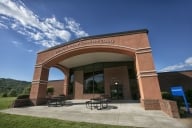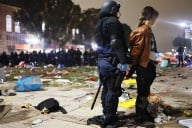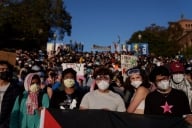You have /5 articles left.
Sign up for a free account or log in.
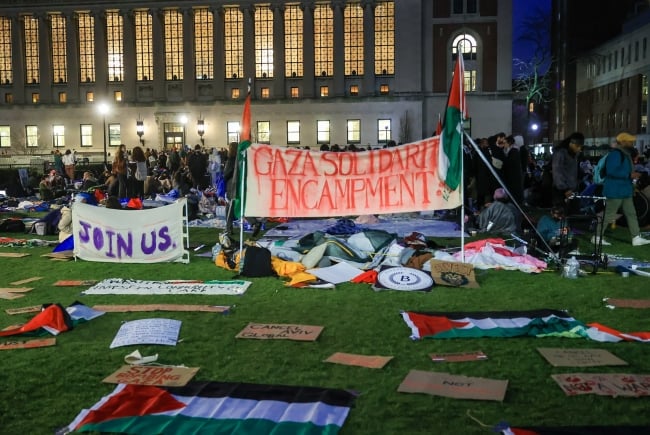
Protests continued on the Columbia campus over the weekend.
Photo by Selcuk Acar/Anadolu via Getty Images
Campus unrest stemming from the Israel-Hamas war ratcheted up over the weekend, following last week’s Congressional testimony on antisemitism by Columbia University’s leaders and the arrest of more than 100 pro-Palestinian protesters on the university’s New York campus.
But the tensions spread far beyond Morningside Heights, gripping campuses around the country. A roundup of the latest developments:
Protesters Regroup at Columbia
Discord continued to roil Columbia in the wake of President Minouche Shafik’s decision to authorize police to remove a pro-Palestinian encampment on the South Lawn Thursday. More than 100 students were arrested.
Over the weekend, student protesters regrouped, sitting calmly amid sleeping bags, books, bottled water and snacks. They prayed, chanted and took turns speaking.
Graduate student Layla Saliba told ABC News: “The mass arrests and the suppression of students—I’d say that’s galvanized us.”
Just outside the campus gates, a large and more raucous group of supporters gathered, waving Palestinian flags and chanting slogans like: “Long live the intifada!” and “Hamas, we love you. We support your rockets, too!"
Three more people were arrested.
Elie Buechler, an Orthodox Union rabbi with the Columbia/Barnard Hillel, told CNN’s Jake Tapper Sunday that he had sent a message to about 300 mostly Orthodox Jewish students “strongly” recommending that they “return home as soon as possible and remain home.” He said recent events “have made it clear that Columbia University’s Public Safety and the NYPD cannot guarantee Jewish students’ safety in the face of extreme antisemitism and anarchy.”
In addition to ongoing student protests, Shafik, who took a decidedly harder line against antisemitism before Congress than her former Ivy League peers did in December, is also facing a backlash from faculty, who criticized her for failing to defend academic freedom during her testimony.
Representative Elise Stefanik, who relentlessly questioned Shafik during last week’s hearing, called for her resignation Sunday on X:
“While Columbia’s failed leadership spent hundreds of hours preparing for this week’s Congressional hearing, it clearly was an attempt to cover up for their abject failure to enforce their own campus rules and protect Jewish students on campus,” she wrote. “Over the past few months and especially the last 24 hours, Columbia’s leadership has clearly lost control of its campus putting Jewish students’ safety at risk. It is crystal clear that Columbia University—previously a beacon of academic excellence founded by Alexander Hamilton—needs new leadership.”
The turmoil at Columbia will continue into this week: Early Monday morning, Shafik announced that the university would pivot to online classes. In a statement to the Columbia community, she discouraged students who do not live on campus from coming to Morningside Heights in an effort to “deescalate the rancor and give us all a chance to consider next steps.”
“We need a reset,” she wrote. A working group of administrators and professors would “try to bring the crisis to a resolution,” the statement continued. “That includes continuing discussions with the student protesters and identifying actions we can take as a community to enable us to peacefully complete the term and return to respectful engagement with each other.”
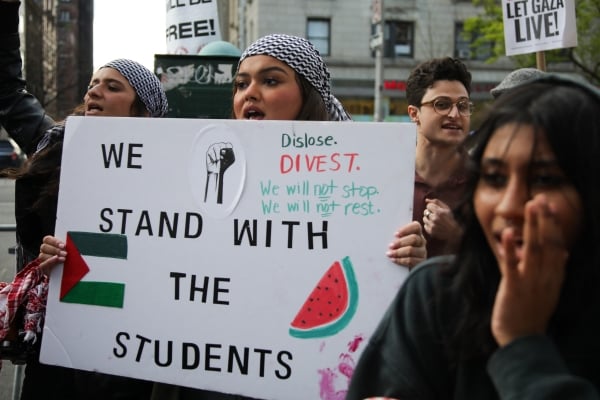
Protesters outside Columbia—and at campuses around the country—showed their support.
Photo by Leonardo Munoz / AFP via Getty Images
Other Campuses Show Solidarity
Pro-Palestinian demonstrators on other campuses around the country rallied in support of their peers at Columbia, New York’s Daily News reported. The University of North Carolina chapter of Students for Justice in Palestine set up their own tent encampment on the Chapel Hill campus “to stand in solidarity with Columbia students who were unjustly detained for peaceful protesting,” group members posted Friday on X.
When police said the tents violated university policy and sought to remove them, the UNC protesters lifted them off the ground and carried them around campus, video footage showed.
Ohio State University’s SJP chapter organized an “emergency protest” Friday in support of “the courageous student activists of the Gaza Solidarity Encampments” at Columbia, according to an Instagram post.
“Our institutions thrive on the bloodshed in Palestine,” it read. “As long as they profit from this brutality, our protests for divestment will persist, and our resolve will only grow stronger … We will not be silenced. We will continue demanding divestment from genocide—from Columbus to Columbia—until justice prevails.”
The SJP chapter at Boston University called for a similar solidarity rally Friday, posting on Instagram: “What is happening at Columbia University is but a microcosm of a larger war being waged on campuses across North America—a war waged by a fascist, McCarthyst [sic] ruling elite long hellbent on destroying our movement for Palestinian liberation. They will fail in their efforts, and we will be victorious. Until then, the struggle continues.”
At Yale University, hundreds of students demonstrated to demand divestment from weapons manufacturers providing aid to Israel, the Hartford Courant reported. They built an encampment similar to Columbia’s outside a dinner honoring President Peter Salovey, who is stepping down at the end of the academic year.
“We are here to defend students’ right to peaceful protest, and we stand in solidarity with our peers who have been arrested and suspended at Columbia,” said Yale student Lumisa Bista in a press release. “We condemn the mobilization of police against students who were demonstrating for peace.”
USC Cancels More Graduation Speakers
Days after the University of Southern California sparked an outcry for canceling the scheduled graduation speech by this year’s valedictorian, a Muslim student, due to unnamed security concerns, officials announced Friday that they were disinviting all outside guest speakers from the May 10 ceremony.
That includes “Crazy Rich Asians” director John Chu, a USC graduate who was scheduled to give the main commencement speech, and tennis icon Billie Jean King, who will still deliver the keynote address at the satellite ceremony for the Annenberg School for Communication and Journalism, the Los Angeles Times reported.
“Given the highly publicized circumstances surrounding our main-stage commencement program, university leadership has decided it is best to release our outside speakers and honorees from attending this year’s ceremony,” read a note to the graduating class from the USC Office of University Events. “We’ve been talking to this exceptional group and hope to confer these honorary degrees at a future commencement or other academic ceremonies.”
The group also includes National Endowment for the Arts Chair Maria Rosario Jackson and Maria McNutt, president of the National Academy of Sciences.
Penn Blocks Pro-Palestinian Student Group
The University of Pennsylvania effectively banned the pro-Palestinian student group Penn Against the Occupation on Friday by revoking its status as a registered student organization, The Philadelphia Inquirer reported. In a statement on Instagram, the group said that following a “weeks-long investigation” into its social media posts, administrators “forced us to remove any affiliation with the University, including changing our Instagram username, and indefinitely prohibited us from hosting any programming on UPenn’s campus.”
A Penn spokesperson told the student newspaper, The Daily Pennsylvanian, that the Office of Student Affairs had revoked Penn Against the Occupation’s registration.
“This group has failed to comply with policies that govern student organizations at Penn, despite repeated efforts to engage with the group and to provide opportunities to resolve noncompliance,” the spokesperson said.
It is not the first pro-Palestinian student group to be blocked on campus; among others, George Washington University banned Students for Justice in Palestine in November, as did Columbia, which also banned Jewish Voice for Peace. In October, the State University System of Florida ordered campus chapters of SJP “deactivated.”

